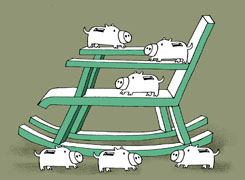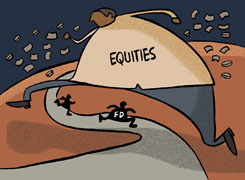I am sixty three and retired . I have 1 cr in mutual funds. Is it safe to invest in debit funds or bank fixed deposits. I am scared of todays market situation
Ans: Investing in retirement requires careful balancing of safety, income, and flexibility. Given your concern about market risks, let’s analyse how bank fixed deposits (FDs) and debt mutual funds stack up as safe options. Both have their strengths, and understanding their differences will help you make a more secure decision.
Understanding Safety in Investments
Bank Fixed Deposits (FDs)
Bank FDs are among the safest investments in India. The Deposit Insurance and Credit Guarantee Corporation (DICGC) insures deposits up to Rs 5 lakh per bank. This makes FDs ideal if you prioritise principal safety.
Debt Mutual Funds
Debt funds invest in a mix of government and corporate bonds. They offer moderate safety, but risk varies by fund type. For example, government securities carry minimal risk, while corporate bonds may have some credit risk. However, debt funds also face interest rate risk, which affects returns based on interest rate fluctuations.
Three spaces
In terms of safety, FDs have an edge over debt funds. However, well-chosen debt funds in safer categories (e.g., liquid, overnight funds) can also offer stability.
Return Potential and Growth
Bank FDs
FDs offer fixed, predictable returns. These are locked in for the term chosen, ensuring no fluctuation. However, returns from FDs might not always beat inflation. For retirees, the potential erosion of purchasing power is a concern.
Debt Mutual Funds
Debt funds typically yield higher returns than FDs, although returns fluctuate. Over time, debt funds often deliver better inflation-adjusted returns. Short-duration debt funds, such as liquid or ultra-short-term funds, are more stable while providing potential for slightly higher returns than FDs.
Three spaces
For better returns, debt funds generally outperform FDs, especially over the long term. FDs, though, are preferred if predictability is more important.
Tax Efficiency and Savings
Taxation plays an essential role in post-retirement planning, as it directly impacts your income.
Bank FDs
Interest earned on FDs is taxed based on your income tax slab. This can be a burden for retirees in higher tax brackets. FDs don’t provide any tax-saving advantage like long-term capital gains (LTCG) do in debt funds.
Debt Mutual Funds
Debt funds offer a tax advantage if held for over three years. Long-term gains are taxed according to your income tax slab. This tax structure can be more favourable for retirees, especially when compared to the slab-based taxation on FD interest.
Three spaces
Debt funds offer more tax-efficient returns than FDs, especially if held for the long term. For high-income retirees, this is a notable benefit.
Liquidity and Accessibility
Bank FDs
Bank FDs can be withdrawn prematurely if necessary, but this usually incurs a penalty. The penalty can reduce overall returns. Thus, while FDs offer some liquidity, it comes at a cost.
Debt Mutual Funds
Debt funds offer higher liquidity than FDs. Most debt funds, except fixed-maturity ones, allow withdrawal anytime without a penalty. This makes them more flexible for retirees who may need funds for unexpected expenses.
Three spaces
For liquidity, debt funds are more convenient than FDs. This added flexibility is helpful for retirees facing uncertain expenses.
Market Sensitivity and Current Situation
Given your concern about the current market situation, here’s how each option stands:
Bank FDs
FDs are unaffected by market movements. Your returns are fixed, regardless of market performance, making FDs ideal during uncertain times. This stability can be reassuring, especially if you are uncomfortable with market fluctuations.
Debt Mutual Funds
Debt funds, particularly long-duration ones, may be impacted by changes in interest rates. However, shorter-duration funds (e.g., liquid funds) are relatively less affected. Avoiding high-risk debt funds can help in uncertain markets.
Three spaces
If market safety is a concern, FDs offer peace of mind. For a balance, opt for conservative debt funds to gain some return without high market sensitivity.
Balancing FDs and Debt Funds in Retirement
Both FDs and debt funds offer benefits for retirees, and combining them can create a balanced approach. Consider the following steps:
Allocate a Portion to FDs for Safety
Keep part of your funds in FDs for a stable, guaranteed return. This provides a safety net and assures some fixed income, which can be comforting.
Invest in Low-Risk Debt Funds for Better Returns
Invest the remaining amount in conservative debt funds, such as liquid or ultra-short-term funds. These funds have lower risk exposure, provide higher tax efficiency, and give better returns than FDs over time.
Maintain an Emergency Reserve
Keep some funds accessible for emergencies. Debt funds, particularly liquid funds, are ideal for this purpose due to their easy liquidity.
Three spaces
A mix of FDs and low-risk debt funds can ensure both security and income growth.
Final Insights
Your primary goal is safety, and both FDs and debt funds can serve this purpose in different ways.
FDs ensure a secure, guaranteed income stream, which helps during uncertain market times.
Debt funds, especially low-risk categories, provide better returns with added flexibility. They also offer tax benefits for retirees with higher incomes.
Balancing these two options will give you a steady income with some growth potential. It’s best to consult a Certified Financial Planner to fine-tune the allocation based on your exact risk tolerance and income needs.
Best Regards,
K. Ramalingam, MBA, CFP,
Chief Financial Planner,
www.holisticinvestment.in
https://www.youtube.com/@HolisticInvestment
.jpg)



























